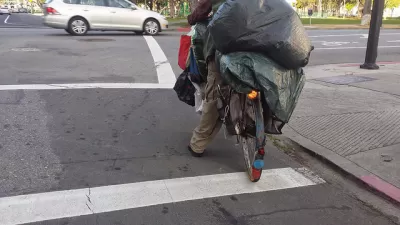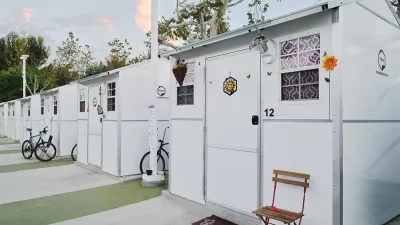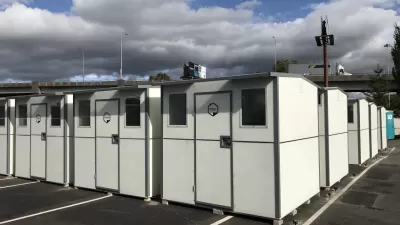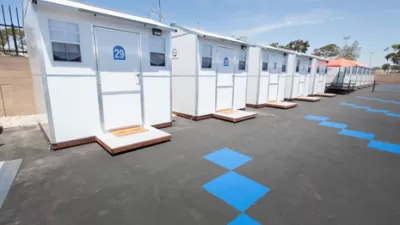Now San Jose's tiny home village pilot project, meant to create 40 units of "sleeping cabins for homeless individuals, needs to find a neighborhood to call home.

"A plan to build 'tiny homes' for San Jose’s homeless residents passed its first major test Tuesday, and now the city must answer the most difficult question — where to put these micro sleeping cabins," reports Ramona Giwargis.
So far, the city has approved a yearlong pilot program that will construct a village of 40 tiny homes. "Elected leaders by next month will come up with three potential sites for the tiny homes and eventually want to place a tiny home village in each of the city’s 10 City Council districts," explains Giwargis of that remaining, significant detail of the program.
The article includes details of the "not in my backyard" voices that gathered at the City Council hearing earlier this week to oppose the program.
The city hired architecture firm Gensler to design two prototype versions of the tiny home concept, as reported by Giwargis earlier this month. Giwargis has been tracking the project as it navigated the political system. Back in August, the city paired down the list of potential sites for a tiny home village. Giwargis included the tiny home idea in an article detailing the city's response to homelessness in June 2017.
FULL STORY: Tiny homes for San Jose’s homeless wins approval after heated debate

Maui's Vacation Rental Debate Turns Ugly
Verbal attacks, misinformation campaigns and fistfights plague a high-stakes debate to convert thousands of vacation rentals into long-term housing.

Planetizen Federal Action Tracker
A weekly monitor of how Trump’s orders and actions are impacting planners and planning in America.

In Urban Planning, AI Prompting Could be the New Design Thinking
Creativity has long been key to great urban design. What if we see AI as our new creative partner?

King County Supportive Housing Program Offers Hope for Unhoused Residents
The county is taking a ‘Housing First’ approach that prioritizes getting people into housing, then offering wraparound supportive services.

Researchers Use AI to Get Clearer Picture of US Housing
Analysts are using artificial intelligence to supercharge their research by allowing them to comb through data faster. Though these AI tools can be error prone, they save time and housing researchers are optimistic about the future.

Making Shared Micromobility More Inclusive
Cities and shared mobility system operators can do more to include people with disabilities in planning and operations, per a new report.
Urban Design for Planners 1: Software Tools
This six-course series explores essential urban design concepts using open source software and equips planners with the tools they need to participate fully in the urban design process.
Planning for Universal Design
Learn the tools for implementing Universal Design in planning regulations.
planning NEXT
Appalachian Highlands Housing Partners
Mpact (founded as Rail~Volution)
City of Camden Redevelopment Agency
City of Astoria
City of Portland
City of Laramie





























